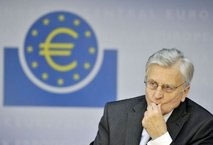Eurozone races to ease contagion fears
 Amid signs that contagion is spreading to Italy, finance ministers from the 17-nation area meet from 1300 GMT, with counterparts from the full European Union 27 joining them Tuesday.
Amid signs that contagion is spreading to Italy, finance ministers from the 17-nation area meet from 1300 GMT, with counterparts from the full European Union 27 joining them Tuesday.
Held on the back of a roller-coaster week that saw Italian banks buckle, the talks will focus on the divisive question of possible private-sector involvement in a second bailout of Greece -- a deal not expected before September.
But discord over bringing banks and other private creditors to bear a share in the new rescue have flared into the open, fuelling further anxiety on already nervous markets.
Just ahead of the eurozone talks, the EU's top economic officers are to get together "to coordinate" on the Greek rescue, an EU official said.
"This is not a crisis meeting, but to coordinate positions," said Dirk De Backer, spokesman for EU president Herman Van Rompuy.
"The agenda is Greece, not Italy," he added of the meeting that will bring together Van Rompuy, European Central Bank chief Jean-Claude Trichet, eurogroup head Jean-Claude Juncker, European Commission president Jose Manuel Barroso and finance commissioner Olli Rehn.
At the heart of the squabble raging across the single currency area is whether private-sector involvement in a bailout could be interpreted as a credit default that would ripple across the entire zone.
European leaders have been working for weeks on drawing private bondholders into a Greek rescue tipped as almost as big as last year's 110-billion-euro bailout. This would be done either by voluntarily buying new Greek bonds when current bonds come due, or swapping them for new, longer-maturing bonds.
But touching off a powder-keg response, Standard & Poor's ratings agency last week said even a soft-option voluntary rollover "could result in a selective default for Greece," meaning Greece would be viewed technically in default, even if rescheduling was voluntary.
The S&P view raised fresh calls from some governments to force the private sector to ease the taxpayer's pain -- whether or not this came down to a default.
"I think we have to accept that a voluntary contribution is not realistic," said Dutch Finance Minister Jan Kees de Jager.
"If a compulsory contribution gives rise to a short and isolated rating event, then it's not so bad," he said, using a term which refers to a default rating.
Germany then leapt into the fray by reviving a Greek bond-swap proposal the ECB has already rejected.
Trichet retorted that the idea of a Greek default, in full or even partial and short-term, was totally unacceptable.
"No credit event, no selective default, no default. That is the present message of the (ECB) governing council," Trichet said last week.
Contributing to the tension, the ECB said that if private sector involvement led ratings agencies to declare Greece in default, it could no longer accept Greek government debt as collateral for loans to Greek banks.
That would probably cause the Greek banking sector to collapse.
France, whose banks hold a sizeable proportion of Greek debt, has proposed a voluntary scheme under which private creditors would opt to replace Greek debt about to mature with new 30-year bonds.
The impasse leaves the idea of private sector involvement almost dead in the water while markets demand ever higher rates of return to provide funding for weak eurozone members, and Italy and Spain are now at risk of being sucked in.
The plan to involve the private sector however won backing from key global finance group, the Institute of International Finance (IIF), which represents banks, insurers and investment funds, and which held talks in Europe last week.
What the stars mean:
★ Poor ★ ★ Promising ★★★ Good ★★★★ Very good ★★★★★ Exceptional
Related Contents
Latest News
More News
- Russian President congratulates Vietnamese Party leader during phone talks (January 25, 2026 | 09:58)
- Worldwide congratulations underscore confidence in Vietnam’s 14th Party Congress (January 23, 2026 | 09:02)
- Political parties, organisations, int’l friends send congratulations to 14th National Party Congress (January 22, 2026 | 09:33)
- 14th National Party Congress: Japanese media highlight Vietnam’s growth targets (January 21, 2026 | 09:46)
- 14th National Party Congress: Driving force for Vietnam to continue renewal, innovation, breakthroughs (January 21, 2026 | 09:42)
- Vietnam remains spiritual support for progressive forces: Colombian party leader (January 21, 2026 | 08:00)
- Int'l media provides large coverage of 14th National Party Congress's first working day (January 20, 2026 | 09:09)
- Vietnamese firms win top honours at ASEAN Digital Awards (January 16, 2026 | 16:45)
- ASEAN Digital Ministers' Meeting opens in Hanoi (January 15, 2026 | 15:33)
- ASEAN economies move up the global chip value chain (December 09, 2025 | 13:32)

 Tag:
Tag:




















 Mobile Version
Mobile Version